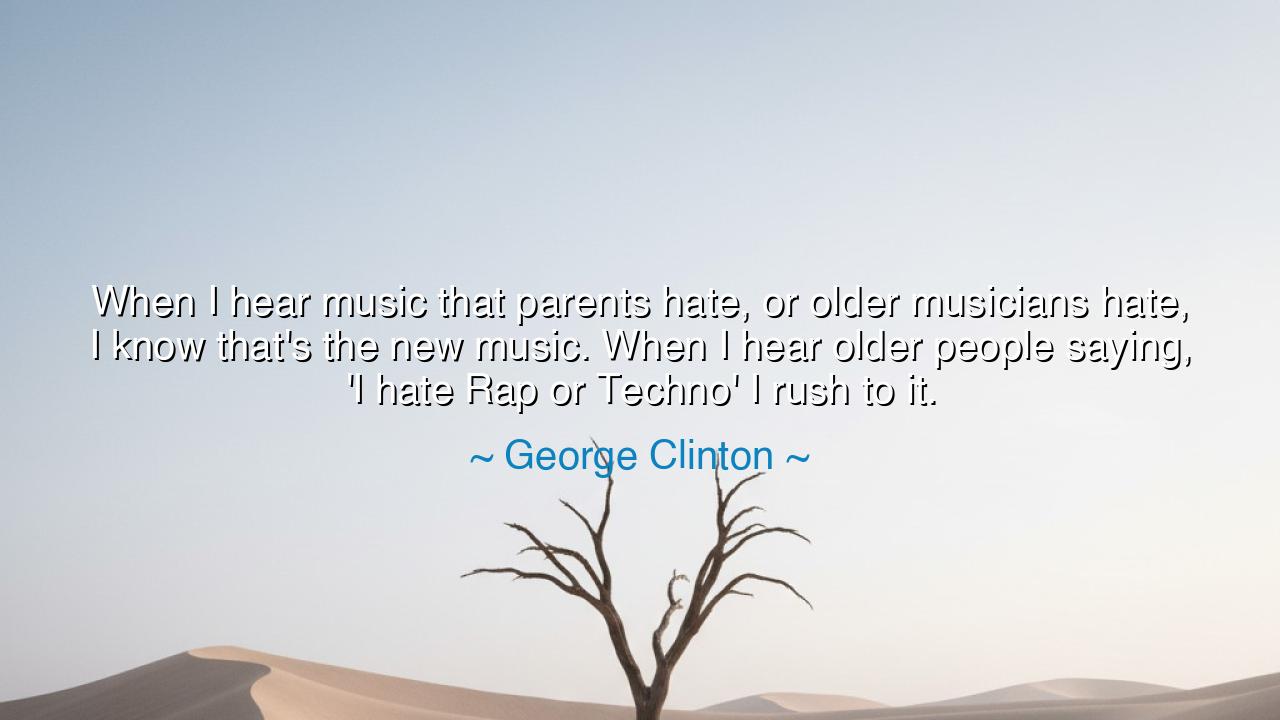
When I hear music that parents hate, or older musicians hate, I
When I hear music that parents hate, or older musicians hate, I know that's the new music. When I hear older people saying, 'I hate Rap or Techno' I rush to it.






Hear the bold and mischievous words of George Clinton: “When I hear music that parents hate, or older musicians hate, I know that’s the new music. When I hear older people saying, ‘I hate Rap or Techno,’ I rush to it.” These are not words of rebellion alone, but of wisdom forged through decades of creation. Clinton, the father of funk, teaches us that every age brings forth sounds that disturb the old order, unsettle the guardians of tradition, and announce the arrival of something fresh. What is scorned by the elders often carries the fire of the future.
The ancients knew this truth well. When the poet Sappho sang in Greece, her verses of love and passion scandalized many who clung to sterner traditions. Yet her words endured, shaping the course of poetry for centuries. Likewise, when the philosopher Socrates taught the youth of Athens to question authority, he was condemned by older men who feared the ruin of their ways. What the elders despised became the seed of transformation. So too, Clinton recognizes that music hated by parents or “older musicians” is often the sound of new generations finding their voice.
Consider the rise of jazz. In its earliest days, it was derided as noise, immoral, the destruction of “real music.” Yet within its rhythms lay the soul of a people and the birth of a new artistic age. Later came rock and roll, dismissed by parents as dangerous rebellion, yet destined to become the anthem of freedom for millions. The same was true for hip-hop: once dismissed as crude and unworthy, now it shapes the language, fashion, and identity of entire cultures. In each case, the music that was hated was precisely the music that transformed the world.
George Clinton himself carried this torch in his day. With Parliament-Funkadelic, he blurred the lines between soul, rock, and psychedelic sounds, creating music that shocked the establishment. Funk was strange, wild, and sometimes dismissed as chaotic noise. But Clinton understood that true innovation often comes clothed in strangeness. His instinct to “rush to” the new is the instinct of a creator who recognizes that discomfort is the midwife of progress.
The meaning of Clinton’s words is powerful: that resistance is often the sign of something alive and revolutionary. What the old reject is often what the young need to express themselves. It is not that the old ways are worthless, but that every generation must break the mold in order to breathe. The clash between the old and the new is not a tragedy—it is the very engine of growth.
The lesson is clear: do not flee from what is unfamiliar or despised. When you hear the world mock an idea as too strange, too reckless, or too noisy, look closer—it may be the beginning of something extraordinary. Music, like life itself, evolves through friction, through challenge, through daring experiments that others fear to embrace. To rush to the new is to place yourself at the frontier of creation.
Practical action lies before you: when you encounter a sound, an idea, or a movement that unsettles the older generation, do not reject it outright. Ask what truth it carries, what hunger it reveals, what new path it may be opening. Embrace the courage to listen with open ears and open heart. For the new is often born in the form of the uncomfortable. If you learn to see this, you will not only witness the future—you will help shape it.
So let George Clinton’s words resound across time: “When I hear music that parents hate, or older musicians hate, I know that’s the new music… I rush to it.” Carry this wisdom with you. Do not cling only to the safe and the known. Seek out the daring, the unsettling, the revolutionary. For it is in what the world first rejects that the voice of tomorrow is often found. And those who rush to it, like Clinton, will always be among the first to taste the future.






AAdministratorAdministrator
Welcome, honored guests. Please leave a comment, we will respond soon